Madeline Yale Wynne:
The Little Room
‘How would it do for a smoking-room?’ ‘Just the very place! only, you know, Roger, you must not

think of smoking in the house. I am almost afraid that having just a plain, common man around, let alone a smoking man, will upset Aunt Hannah. She is New England—Vermont New England—boiled down.’
 ‘You leave Aunt Hannah to me; I’ll find her tender side. I’m going to ask her about the old sea-captain and the yellow calico.’
‘You leave Aunt Hannah to me; I’ll find her tender side. I’m going to ask her about the old sea-captain and the yellow calico.’‘Not yellow calico—blue chintz.’ ‘Well, yellow shell then.’ ‘No, no! don’t mix it up so; you won’t know yourself what
to expect, and that’s half the fun.’ ‘Now you tell me again exactly what to expect; to tell the truth, I didn’t half hear about it the other day; I was wool- gathering. It was something queer that happened when you were a child, wasn’t it?’
‘Something that began to happen long before that, and kept happening, and may happen again; but I hope not.’ ‘What was it?’ ‘I wonder if the other people in the car can hear us?’ ‘I fancy not; we don’t hear them—not consecutively, at least.’
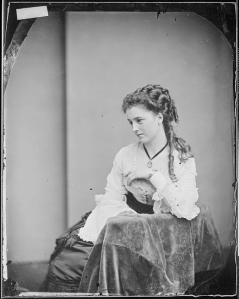 ‘Well,
mother was born in Vermont, you know; she was the only child by a
second marriage. Aunt Hannah and Aunt Maria are only half-aunts to me,
you know.’ ‘I hope they are half as nice as you are.’ ‘Roger, be still;
they certainly will hear us.’ ‘Well, don’t you want them to know we are
married?’ ‘Yes, but not just married. There’s all the difference in the
‘Well,
mother was born in Vermont, you know; she was the only child by a
second marriage. Aunt Hannah and Aunt Maria are only half-aunts to me,
you know.’ ‘I hope they are half as nice as you are.’ ‘Roger, be still;
they certainly will hear us.’ ‘Well, don’t you want them to know we are
married?’ ‘Yes, but not just married. There’s all the difference in the 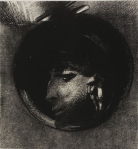 world.’ ‘You are afraid we look too happy!’ ‘No; only I want my happiness all to myself.’ ‘Well, the little room?
world.’ ‘You are afraid we look too happy!’ ‘No; only I want my happiness all to myself.’ ‘Well, the little room?’‘My aunts brought mother up; they were nearly twenty years older than she. I might say Hiram and they brought her up. You see, Hiram was bound out to my grandfather when he was a boy, and when grandfather died Hiram said he “s’posed he went with the farm, long o’ the critters,” and he has been there ever since. He was my mother’s only refuge from the decorum of my aunts. They are simply workers. They make me think of the Maine woman who wanted her epitaph to be: “She was a hard working woman.” “They must be almost beyond their working-days. How old are they? “Seventy, or thereabouts; but they will die standing; or, at least, on a Saturday night, after all the house-work is done up. They were rather strict with mother, and I think she had a lonely childhood. The house is almost a mile away from any neighbors, and off on top of what they call
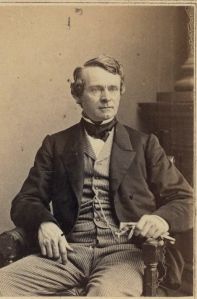 Stony Hill. It is bleak enough up there, even in summer.
Stony Hill. It is bleak enough up there, even in summer.‘When mamma was about ten years old they sent her to cousins in Brooklyn, who had children of their own, and knew more about bringing them up. She staid there till she was married; she didn’t go to Vermont in all that time, and of course hadn’t seen her sisters, for they never would leave home for a day. They couldn’t even be induced to go to Brooklyn to her wedding, so she and father took their wedding trip
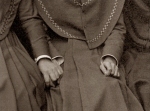 up
there.’ ‘And that’s why we are going up there on our own?’ ‘Don’t,
Roger; you have no idea how loud you speak.’ ‘You never say so except
when I am going to say that one little word.’ ‘Well, don’t say it, then,
or say it very, very quietly.’ ‘Well, what was the queer thing?’ ‘When
they got to the house, mother wanted to take father right off into the
little room; she had been telling him about it, just as I am going to
tell you, and she had said that of all the rooms, that one was the only
one that seemed pleasant to her. She described the furniture and the
books and paper and every- thing, and said it was on the north side,
between the front and back room. Well, when they went to look for it,
there was no little room there; there was only a shallow china-closet.
She asked her sisters when the house had been altered and a closet made
of the room that used to be there. They both said the house was exactly
as it had been built—that they had never made any changes, except to
tear down the old wood-shed and build a smaller one.
up
there.’ ‘And that’s why we are going up there on our own?’ ‘Don’t,
Roger; you have no idea how loud you speak.’ ‘You never say so except
when I am going to say that one little word.’ ‘Well, don’t say it, then,
or say it very, very quietly.’ ‘Well, what was the queer thing?’ ‘When
they got to the house, mother wanted to take father right off into the
little room; she had been telling him about it, just as I am going to
tell you, and she had said that of all the rooms, that one was the only
one that seemed pleasant to her. She described the furniture and the
books and paper and every- thing, and said it was on the north side,
between the front and back room. Well, when they went to look for it,
there was no little room there; there was only a shallow china-closet.
She asked her sisters when the house had been altered and a closet made
of the room that used to be there. They both said the house was exactly
as it had been built—that they had never made any changes, except to
tear down the old wood-shed and build a smaller one.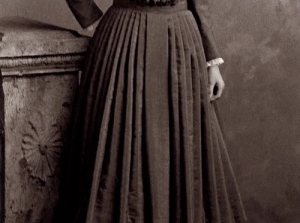 ‘Father
and mother laughed a good deal over it, and when anything was lost they
would always say it must be in the little room, and any exaggerated
statement was called “little-roomy.” When I was a child I thought that
was a regular English phrase, I heard it so often. ‘Well, they talked it
over, and finally they concluded that my mother had been a very
imaginative sort of a child, and had read in some book about such a
little room, or perhaps even dreamed it, and then had “made believe,” as
children do, till she herself had really thought the room was there.’
‘Father
and mother laughed a good deal over it, and when anything was lost they
would always say it must be in the little room, and any exaggerated
statement was called “little-roomy.” When I was a child I thought that
was a regular English phrase, I heard it so often. ‘Well, they talked it
over, and finally they concluded that my mother had been a very
imaginative sort of a child, and had read in some book about such a
little room, or perhaps even dreamed it, and then had “made believe,” as
children do, till she herself had really thought the room was there.’‘Why, of course, that might easily happen.’
‘Yes, but you haven’t heard the queer part yet; you wait and see if you can explain the rest as easily.
‘They stayed at the farm two weeks, and then went to New York to live. When I was eight
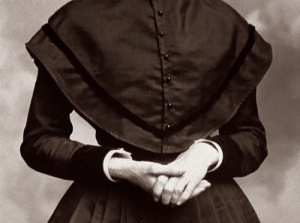 years
old my father was killed in the war, and mother was broken-hearted. She
never was quite strong afterwards, and that summer we decided to go up
to the farm for three months.
years
old my father was killed in the war, and mother was broken-hearted. She
never was quite strong afterwards, and that summer we decided to go up
to the farm for three months.‘I was a restless sort of a child, and the journey seemed very long to me; and finally, to pass the time, mamma told me the story of the little room, and how it was all in her own imagination, and how there really was only a china-closet there.
‘She told it with all the particulars; and even to me, who knew beforehand that the room wasn’t there, it seemed just as real as could be. She said it was on the north side, between the front and back rooms; that it was very small, and they some- times called it an entry. There was a door also that opened out- of-doors, and that one was painted green, and was cut in the middle like the old Dutch doors, so that it could be used for a window by opening the top part only. Directly opposite the door was a lounge or couch;
 it
was covered with blue chintz— India chintz—some that had been brought
over by an old Salem sea-captain as a “venture.” He had given it to
Hannah when she was a young girl. She was sent to Salem for two years to
school. Grandfather originally came from Salem.’
it
was covered with blue chintz— India chintz—some that had been brought
over by an old Salem sea-captain as a “venture.” He had given it to
Hannah when she was a young girl. She was sent to Salem for two years to
school. Grandfather originally came from Salem.’‘I thought there wasn’t any room or chintz.’ ‘That is just it. They had decided that
 mother
had imagined it all, and yet you see how exactly everything was painted
in her mind, for she had even remembered that Hiram had told her that
Hannah could have married the sea-captain if she had wanted to!
mother
had imagined it all, and yet you see how exactly everything was painted
in her mind, for she had even remembered that Hiram had told her that
Hannah could have married the sea-captain if she had wanted to!‘The India cotton was the regular blue stamped chintz, with the peacock figure on it. The head and body of the bird were in profile, while the tail was full front view behind it. It had seemed to take mamma’s fancy, and she drew it for me on a piece of paper as she talked. Doesn’t it seem strange to you that she could have made all that up, or even dreamed it?
‘At the foot of the lounge were some hanging shelves with some old books on them. All the books were leather-colored except one; that was bright red, and was called the Ladies’ Album. It made a bright break between the other thicker books. ‘On the lower shelf was a beautiful pink sea-shell, lying on a mat made of balls of red shaded worsted. This shell was greatly coveted by
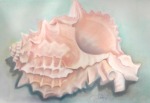 mother,
but she was only allowed to play with it when she had been particularly
good. Hiram had shown her how to hold it close to her ear and hear the
roar of the sea in it.
mother,
but she was only allowed to play with it when she had been particularly
good. Hiram had shown her how to hold it close to her ear and hear the
roar of the sea in it.‘I know you will like Hiram, Roger; he is quite a character in his way.
‘Mamma said she remembered, or thought she remembered, having been sick once, and she had to lie quietly for some days on the lounge; then was the time she had become so familiar with everything in the room, and she had been allowed to have the shell to play with all the time. She had had her toast brought to her in there, with
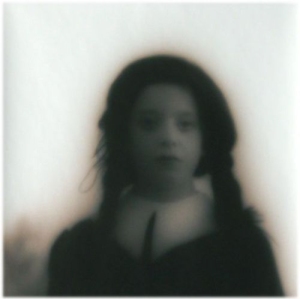 make-believe tea. It was one of her pleasant memories of her childhood; it was the first
make-believe tea. It was one of her pleasant memories of her childhood; it was the first  time she had been of any importance to anybody, even herself.
time she had been of any importance to anybody, even herself.‘Right at the head of the lounge was a light-stand, as they called it, and on it was a very brightly polished brass candle- stick and a brass tray, with snuffers. That is all I remember of her describing, except that there was a braided rag rug on the floor, and on the wall was a beautiful flowered paper—roses and morning-glories in a wreath on a light blue ground. The same paper was in the front room.’
‘And all this never existed except in her imagination?’
‘She said that when she and father went up there, there wasn’t any little room at all like it anywhere in the house; there was a china-closet where she had believed the room to be.’ ‘And your aunts said there had never been any such room.’ ‘That is what they said.’ ‘Wasn’t there any blue chintz in the house with a peacock
figure?’ ‘Not a scrap, and Aunt Hannah said there had never been any that she could remember; and Aunt Maria just echoed her—she always does that. You see, Aunt Hannah is an up-and-down New England woman. She looks just like herself; I mean, just like her character. Her joints move up and down or backward and forward in a plain square fashion. I don’t believe she ever leaned on anything in her life, or sat in an easy-chair. But Maria is different; she is rounder and
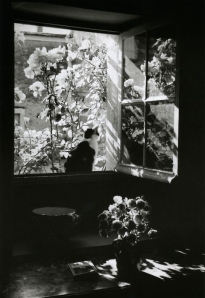 softer;
she hasn’t any ideas of her own; she never had any. I don’t believe she
would think it right or becoming to have one that differed from Aunt
Hannah’s, so what would be the use of having any? She is an echo, that’s
all.
softer;
she hasn’t any ideas of her own; she never had any. I don’t believe she
would think it right or becoming to have one that differed from Aunt
Hannah’s, so what would be the use of having any? She is an echo, that’s
all.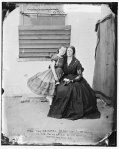 ‘When
mamma and I got there, of course I was all excitement to see the
china-closet, and I had a sort of feeling that it would be the little
room after all. So I ran ahead and threw open the door, crying, “Come
and see the little room.”
‘When
mamma and I got there, of course I was all excitement to see the
china-closet, and I had a sort of feeling that it would be the little
room after all. So I ran ahead and threw open the door, crying, “Come
and see the little room.”‘And Roger,’ said Mrs. Grant, laying her hand in his, ‘there really was a little room there, exactly as mother had remembered it. There was the lounge, the peacock chintz, the green door, the shell, the morning-glory, and rose paper, everything exactly as she had described it to me.’
‘What in the world did the sisters say about it?’
‘Wait a minute and I will tell you. My mother was in the front hall still talking with Aunt Hannah. She didn’t hear me at first, but I ran out there and dragged her through the front room, saying, “The room is here—it is all right.”
‘It seemed for a minute as if my mother would faint. She clung to me in terror. I can remember now how strained her eyes looked and how pale she was.
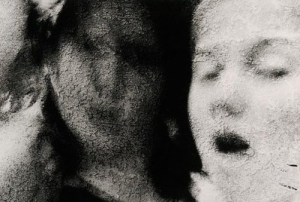 ‘I
called out to Aunt Hannah and asked her when they had had the closet
taken away and the little room built; for in my excitement I thought
that that was what had been done.
‘I
called out to Aunt Hannah and asked her when they had had the closet
taken away and the little room built; for in my excitement I thought
that that was what had been done.‘“That little room has always been there,” said Aunt Hannah, “ever since the house was built.”
‘“But mamma said there wasn’t any little room here, only a china-closet, when she was here with papa,” said I.‘“No, there has never been any china-closet there; it has always been just as it is now,” said Aunt Hannah.
‘Then mother spoke; her voice sounded weak and far off. She said, slowly, and with an effort, “Maria, don’t you remember that you told me that there had never been any little room here? and Hannah said so too, and then I said I must have dreamed it?”
‘“No, I don’t remember anything of the kind,” said Maria, without the slightest emotion. “I don’t remember you ever said anything about any
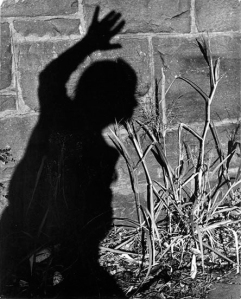 china-closet. The house has never been altered; you used to play in this room when you were a child, don’t you remember?”
china-closet. The house has never been altered; you used to play in this room when you were a child, don’t you remember?”‘“I know it,” said mother, in that queer slow voice that made me feel frightened. “Hannah, don’t
 you
remember my finding the china-closet here, with the gilt-edged china on
the shelves, and then you said that the china-closet had always been
here?”
you
remember my finding the china-closet here, with the gilt-edged china on
the shelves, and then you said that the china-closet had always been
here?”‘“No,” said Hannah, pleasantly but unemotionally—“no, I don’t think you ever asked me about any china-closet, and we haven’t any gilt-edged china that I know of.”
‘And that was the strangest thing about it. We never could make them remember that there had ever been any question about it. You would think they could remember how surprised mother had been before, unless she had imagined the whole thing. Oh, it was so queer! They were always pleasant about it, but they didn’t seem to feel any interest or curiosity. It was always this answer: “The house is just as it was built; there have never been any changes, so far as we know.”
‘And my mother was in an agony of perplexity. How cold their gray eyes looked to me! There was no reading anything in them. It just seemed to break my mother down, this queer thing. Many times that summer, in the middle of the night, I have seen her get up and take a candle and creep softly down- stairs. I could hear the steps creak under her weight. Then she would go through the
 front
room and peer into the darkness, holding her thin hand between the
candle and her eyes. She seemed to think the little room might vanish.
Then she would come back to bed and toss about all night, or lie still
and shiver; it used to frighten me.
front
room and peer into the darkness, holding her thin hand between the
candle and her eyes. She seemed to think the little room might vanish.
Then she would come back to bed and toss about all night, or lie still
and shiver; it used to frighten me.‘She grew pale and thin, and she had a little cough; then she did not like to be left alone.
 Sometimes
she would make errands in order to send me to the little room for
something—a book, or her fan, or her handkerchief; but she would never
sit there or let me stay in there long, and sometimes she wouldn’t let
me go in there for days together. Oh, it was pitiful!’
Sometimes
she would make errands in order to send me to the little room for
something—a book, or her fan, or her handkerchief; but she would never
sit there or let me stay in there long, and sometimes she wouldn’t let
me go in there for days together. Oh, it was pitiful!’‘Well, don’t talk any more about it, Margaret, if it makes you feel so,’ said Mr. Grant.
‘Oh yes, I want you to know all about it, and there isn’t much more—no more about the room.
‘Mother never got well, and she died that autumn. She used often to sigh, and say, with a wan little laugh, “There is one thing I am glad of, Margaret: your father knows now all about the little room.” I think she was afraid I distrusted her. Of course, in a child’s way, I thought there was something queer about it, but I did not brood over it. I was too young then, and took it as a part of her illness. But, Roger, do you know, it really did affect me. I almost hate to go there after talking about it; I somehow feel as if it might, you know, be a china-closet again.’
‘That’s an absurd idea.’
‘I know it; of course it can’t be. I saw the room, and there isn’t any china-closet there, and no gilt-edged china in the house, either.’
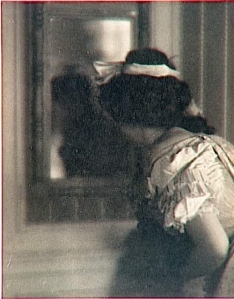
And then she whispered: ‘But, Roger, you may hold my hand as you do now, if you will, when we go to look for the little room.’
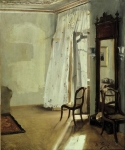 ‘And
you won’t mind Aunt Hannah’s gray eyes?’ ‘I won’t mind anything.’ It
was dusk when Mr. and Mrs. Grant went into the gate under the two old
Lombardy poplars and walked up the narrow path to the door, where they
were met by the two aunts.
‘And
you won’t mind Aunt Hannah’s gray eyes?’ ‘I won’t mind anything.’ It
was dusk when Mr. and Mrs. Grant went into the gate under the two old
Lombardy poplars and walked up the narrow path to the door, where they
were met by the two aunts.Hannah gave Mrs. Grant a frigid but not unfriendly kiss; and Maria seemed for a moment to tremble on the verge of an emotion, but she glanced at Hannah, and then gave her greeting in exactly the same repressed and non-committal way.
Supper was waiting for them. On the table was the gilt-edged china. Mrs. Grant didn’t notice it immediately, till she saw her husband smiling at her over his teacup; then she felt fidgety, and couldn’t eat. She was nervous, and kept wondering what was behind her, whether it would be a little room or a closet.
After supper she offered to help about the dishes, but, mercy! she might as well have offered to help bring the seasons round; Maria and Hannah couldn’t be helped.
So she and her husband went to find the little room, or closet, or whatever was to be there.
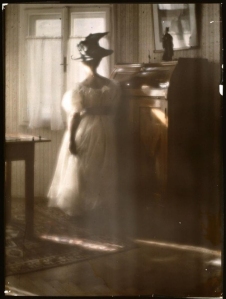 Aunt Maria followed them, carrying the lamp, which she set down, and then went back to the dish-washing.
Aunt Maria followed them, carrying the lamp, which she set down, and then went back to the dish-washing.Margaret looked at her husband. He kissed her, for she seemed troubled; and then, hand in hand, they opened the door. It opened into a china-closet. The shelves were neatly draped with scalloped
 paper;
on them was the gilt-edged china, with the dishes missing that had been
used at the supper, and which at that moment were being carefully
washed and wiped by the two aunts.
paper;
on them was the gilt-edged china, with the dishes missing that had been
used at the supper, and which at that moment were being carefully
washed and wiped by the two aunts.Margaret’s husband dropped her hand and looked at her. She was trembling a little, and turned to him for help, for some explanation, but in an instant she knew that something was wrong. A cloud had come between them; he was hurt; he was antagonized.
He paused for an appreciable instant, and then said, kindly enough, but in a voice that cut her deeply:
‘I am glad this ridiculous thing is ended; don’t let us speak of it again.’
‘Ended!’ said she. ‘How ended?’ And somehow her voice sounded to her as her mother’s voice had when she stood there and questioned her sisters about the little room. She seemed to have to drag her words out. She spoke slowly: ‘It seems to me to have only just begun in my case. It was just so with mother when she—’
‘I really wish, Margaret, you would let it drop. I don’t like to hear you speak of your mother in connection with it. It—’ He hesitated, for was
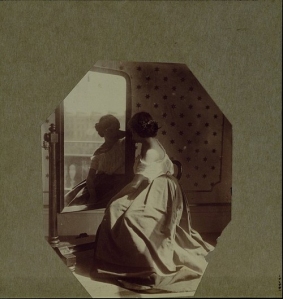 not this their wedding-day? ‘It doesn’t seem quite the thing, quite delicate, you know, to use her name in the matter.’
not this their wedding-day? ‘It doesn’t seem quite the thing, quite delicate, you know, to use her name in the matter.’She saw it all now: he didn’t believe her. She felt a chill sense of withering under his glance.
‘Come,’ he added, ‘let us go out, or into the dining-room, somewhere, anywhere, only drop this nonsense.’He went out; he did not take her hand now—he was vexed, baffled, hurt. Had he not given her his sympathy, his attention, his belief—and his hand?—and she was fooling him. What did it mean?—she so truthful, so free from morbidness—a thing he hated. He walked up and down under the poplars, trying to get into the mood to go and join her in the house.
Margaret heard him go out; then she turned and shook the shelves; she reached her hand behind them and tried to push the boards away; she ran out of the house on to the north side and tried to find in the darkness, with her hands, a door, or some steps leading to one. She tore her dress on the old rose-trees, she fell and rose and stumbled, then she sat down on the ground and tried to think. What could she think—was she dreaming?
She went into the house and out into the kitchen, and begged Aunt Maria to tell her about the little room—what had become of it, when had they built the closet, when had they
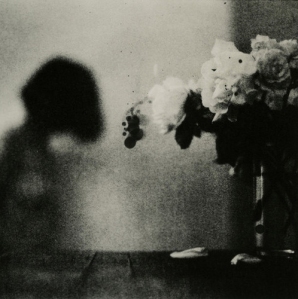 bought the gilt-edged china?
bought the gilt-edged china?They went on washing dishes and drying them on the spot- less towels with methodical exactness; and as they worked they said that there had never been any little room, so far as they knew; the china-closet had always been there, and the gilt-edged china had belonged to their mother, it had always been in the house.
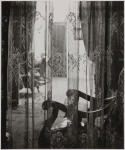
‘No, I don’t remember that your mother ever asked about any little room,’ said Hannah. ‘She didn’t seem very well that summer, but she never asked about any changes in the house; there hadn’t ever been any changes.’
There it was again: not a sign of interest, curiosity, or annoyance, not a spark of memory.
She went out to Hiram. He was telling Mr. Grant about the farm. She had meant to ask him about the room, but her lips were sealed before her husband.
Months afterwards, when time had lessened the sharpness of their feelings, they learned to speculate reasonably about the phenomenon, which Mr. Grant had accepted as something not to be scoffed away, not to be treated as a poor joke, but to be put aside as something inexplicable on any ordinary theory.
Margaret alone in her heart knew that her mother’s words carried a deeper significance than she had dreamed of at the time. ‘One thing I am
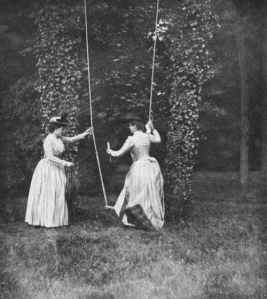 glad of, your father knows now,’ and she wondered if Roger or she would ever know.
glad of, your father knows now,’ and she wondered if Roger or she would ever know.Five years later they were going to Europe. The packing was done; the children were lying asleep, with their travelling things ready to be slipped on for an early start.
Roger had a foreign appointment. They were not to be back in America for some years. She had meant to go up to say good-by to her aunts; but a mother of three children intends to do a great many things that never get done. One thing she had done that very day, and as she paused for a moment between the writing of two notes that must be posted before she went to bed, she said:
‘Roger, you remember Rita Lash? Well, she and Cousin Nan go up to the Adirondacks every autumn. They are clever girls, and I have intrusted to them something I want done very much.’
‘They are the girls to do it, then, every inch of them.’ ‘I know it, and they are going to.’ ‘Well?’ ‘Why, you see, Roger, that little room—’
‘Oh—’
‘Yes, I was a coward not to go myself, but I didn’t find time, because I hadn’t the courage.’
‘Oh! that was it, was it?’ ‘Yes, just that. They are going, and they will write us about it.’ ‘Want
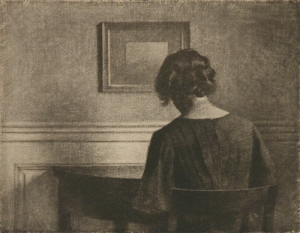 to
bet?’ ‘No; I only want to know.’ Rita Lash and Cousin Nan planned to go
to Vermont on their way to the Adirondacks. They found they would have
three hours between trains, which would give them time to drive up to
the Keys farm, and they could still get to the camp that night. But, at
the last minute, Rita was prevented from going. Nan had to go to meet
the Adirondack party, and she promised to telegraph her when she arrived
at the camp. Imagine Rita’s amusement when she received this message:
‘Safely arrived;
to
bet?’ ‘No; I only want to know.’ Rita Lash and Cousin Nan planned to go
to Vermont on their way to the Adirondacks. They found they would have
three hours between trains, which would give them time to drive up to
the Keys farm, and they could still get to the camp that night. But, at
the last minute, Rita was prevented from going. Nan had to go to meet
the Adirondack party, and she promised to telegraph her when she arrived
at the camp. Imagine Rita’s amusement when she received this message:
‘Safely arrived; went to the Keys farm; it is a little room.’
went to the Keys farm; it is a little room.’Rita was amused, because she did not in the least think Nan had been there. She thought it was a hoax; but it put it into her mind to carry the joke further by really stopping herself when she went up, as she meant to do the next week.She did stop over. She introduced herself to the two maiden ladies, who seemed familiar, as they had been described by Mrs. Grant.
They were, if not cordial, at least not disconcerted at her visit, and willingly showed her over the house. As they did not speak of any other stranger’s having been to see them lately, she became confirmed in her belief that Nan had not been there.
In the north room she saw the roses and morning-glory paper on the wall, and also the door that should open into— what?
 She
asked if she might open it. ‘Certainly,’ said Hannah; and Maria echoed,
‘Certainly.’ She opened it, and found the china-closet. She experienced
a certain relief; she at least was not under any spell. Mrs. Grant left
it a china-closet; she found it the
She
asked if she might open it. ‘Certainly,’ said Hannah; and Maria echoed,
‘Certainly.’ She opened it, and found the china-closet. She experienced
a certain relief; she at least was not under any spell. Mrs. Grant left
it a china-closet; she found it the 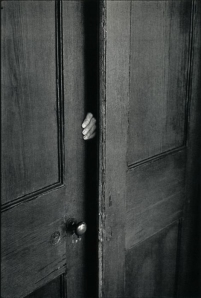 same. Good.
same. Good.But she tried to induce the old sisters to remember that there had at various times been certain questions relating to a confusion as to whether the closet had always been a closet. It was no use; their stony eyes gave no sign.
Then she thought of the story of the sea-captain, and said, ‘Miss Keys, did you ever have a lounge covered with India chintz, with a figure of a peacock on it, given to you in Salem by a sea-captain, who brought it from India?’
‘I dun’no’ as I ever did,’ said Hannah. That was all. She thought Maria’s cheeks were a little flushed, but her eyes were like a stone wall.
She went on that night to the Adirondacks. When Nan and she were alone in their room she said, ‘By-the-way, Nan, what did you see at the farm-house? and how did you like Maria and Hannah?’
Nan didn’t mistrust that Rita had been there, and she began excitedly to tell her all about her visit. Rita could almost have believed Nan had been there if she hadn’t known it was not so. She let her go on for some time, enjoying her enthusiasm, and the impressive way in which she described her opening the door and finding the ‘little room.’ Then Rita said: ‘Now, Nan, that is enough fibbing. I went to the farm myself on my way up yesterday, and there is no little room, and there never has been any; it is a china-
 closet, just as Mrs. Grant saw it last.’
closet, just as Mrs. Grant saw it last.’She was pretending to be busy unpacking her trunk, and did not look up for a moment; but as Nan did not say anything, she glanced at her over her shoulder. Nan was actually pale, and it was hard to say whether she was most angry or frightened. There was something of both in her look. And then Rita began to explain how her telegram had put her in the spirit of going up there alone. She hadn’t meant to cut Nan out. She only thought— Then Nan broke in: ‘It isn’t that; I am
 sure you can’t think it is that. But I went myself, and you did not go; you can’t have been there, for it is a little room.’
sure you can’t think it is that. But I went myself, and you did not go; you can’t have been there, for it is a little room.’Oh, what a night they had! They couldn’t sleep. They talked and argued, and then kept still for a while, only to break out again, it was so absurd. They both maintained that they had been there, but both felt sure the other one was either crazy or obstinate beyond reason. They were wretched; it was perfectly ridiculous, two friends at odds over such a thing; but there it was—‘little room,’ ‘china-closet,’—‘china-closet,’ ‘little room.’
The next morning Nan was tacking up some tarlatan at a window to keep the midges out. Rita offered to help her, as she had done for the past ten years. Nan’s ‘No, thanks,’ cut her to the heart.
‘Nan,’ said she, ‘come right down from that step-ladder and pack your satchel. The stage leaves in just twenty minutes. We can catch the afternoon express train, and we will go together to the farm. I am either going there or going home. You better go with me.’
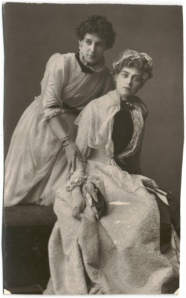
Nan didn’t say a word. She gathered up the hammer and tacks, and was ready to start when the stage came round.
It meant for them thirty miles of staging and six hours of train, besides crossing the lake; but what of that,
 compared
with having a lie lying round loose between them! Europe would have
seemed easy to accomplish, if it would settle the question.
compared
with having a lie lying round loose between them! Europe would have
seemed easy to accomplish, if it would settle the question.At the little junction in Vermont they found a farmer with a wagon full of meal-bags. They asked him if he could not take them up to the old Keys farm and bring them back in time for the return train, due in two hours.
They had planned to call it a sketching trip, so they said, ‘We have been there before, we are artists, and we might find some views worth taking; and we want also to make a short call upon the Misses Keys.’
‘Did ye calculate to paint the old house in the picture?’
Possible they might do so. They wanted to see it, anyway.
‘Waal, I guess you are too late. The house burnt down last night, and everything in it.’
1895

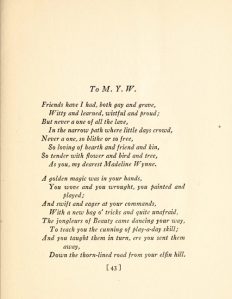 The
contrast between the plain and innocuous -even chatty- tone of this
story, and its ‘New England Gothic’ narrative is difficult to catch but
then impossible to miss. The conversational note is at obvious odds
with its hallucinatory content, confusing cast of characters and shifts
in voice.
The
contrast between the plain and innocuous -even chatty- tone of this
story, and its ‘New England Gothic’ narrative is difficult to catch but
then impossible to miss. The conversational note is at obvious odds
with its hallucinatory content, confusing cast of characters and shifts
in voice.The juxtaposition is so dramatically disconcerting that the whole story lies on top of the mind like a large pool of water on a lily pad, and threatens to slip off entirely with no more than the slightest hint of provocation.
The apparitional atmospherics which cast their supernatural shadow over the entire story, serve a multiple purpose: they proved a tacit, covert and tangential commentary on the inner content of the four different pairing – the female siblings, Hannah and Maria the parents of the principle narrator Margaret Grant, Margaret and her husband Roger, and Margaret’s cousin Nan and her partner of ten years, Rita Lash, but furthermore, there is the classic code we now easily recognise and interpret as ‘lesbian’ – when female pairings occur in the presence of the uncanny or unreal.
The chord struck by ‘The Little Room’ seems also to have some of the undertones of Gaslight, that acutely psychological film with Ingrid Bergman and Charles Boyer, where a husband resolves to drive his naive and innocent wife mad by making her doubt her perception of reality – and therefore
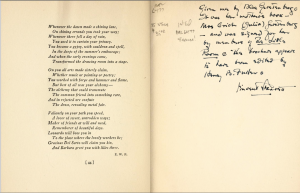 her sanity.
her sanity.Shared reality is the basis of what we take the world to be. Even when we freely acknowledge that no two of us experience the same phenomenon in the same way, we don’t doubt the existence of either the object or the experience. The evidence of the senses, even when treated with a wry humour, is not something that we like to question or tamper with, because the moment we do so we begin to lose our footing in the ordinary world, and enter the realm of the uncanny.
The symbolic four dyads and two – more accurately three – generations in ‘The Little Room’ seem to represent separate social, sexual and psychic ‘realities’.
The old sisters, with the set choreography of their roles in relation to each other, are
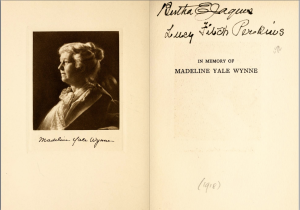 very
much a couple. Their inexplicable bond permits them to corroborate each
other in the event of an oscillating reality – the transmutation of the
room to china closet and back again – with unruffled certainty in each
of the room’s manifestations. We can never be sure whether either one
or both of them are aware of the binary disparity of room vs. closet, or
if they have some perverse reason for refusing to confirm it to anyone
else.
very
much a couple. Their inexplicable bond permits them to corroborate each
other in the event of an oscillating reality – the transmutation of the
room to china closet and back again – with unruffled certainty in each
of the room’s manifestations. We can never be sure whether either one
or both of them are aware of the binary disparity of room vs. closet, or
if they have some perverse reason for refusing to confirm it to anyone
else.Margaret’s parents seem to have come to some kind of truce about their separate understandings about the nature of ‘the little room’, but their uneasy compromise seems in some way connected to their tragic lives. Her father dies in ‘the war’ – which we must take
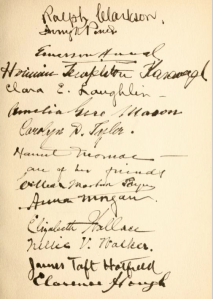 to mean the Civil War – and her mother seems to lose substance and fade
away before dying, and her decline brings to my mind William Blake’s
poem about psychic wasting ‘The Sick Rose’*
to mean the Civil War – and her mother seems to lose substance and fade
away before dying, and her decline brings to my mind William Blake’s
poem about psychic wasting ‘The Sick Rose’*The young married couple Margaret and Roger do not fare so well. Margaret, who saw the room as a child, arrives with her husband to find a china closet in its place. This experience with the alternate and mutually exclusive realities of the room’s separate manifestations which she knows beyond doubt by virtue of the evidence of her senses – becomes a sort of hallucination in the presence of the unwavering certainty of her husband’s male pride.
Roger sees only the china closet, and with this splintering of their previously shared and unquestioned perceptual world there follows the predictably souring outcome of doubt and dismissal and loss of faith.
Some years have passed when Roger’s career require that he and Margaret leave for Europe. Margaret has not forgotten the eerie inexplicable happenings that they have now mutually decided never to discuss, so prior to their departure she writes a letter Nan and Rita asking them to investigate the matter and sort it out for her. Margaret acknowledges that she lacks the courage to conduct the investigation herself, but both she and Roger are heartily convinced that Nan and Rita have exactly what it takes.
Nan and Rita are also obviously a couple -and when they happen to see ‘the little room’ individually, each has her own predictably differing experiences
 of
it’s eliding reality. Their irreconcilable ‘realities’ of the room’s
dual nature causes the now familiar spectre of doubt to interpose itself
between them. Unlike the two married couples however, the two women
struggle with each other in an effort to settle their differences of
perception. They will not allow their bond of ten years duration to be
easily shattered, and are willing to go to whatever lengths – and
travel whatever distances – (Europe would not be too far) in order to
save their shared experience of reality from being meddled or interfered
with. They show every evidence of having been a happy and stable pair
for a full decade, and when the little room begins to cause the first
unwelcome cracks in the structure of their relationship, they are
determined to undertake the long and tiresome journey to the old Aunts’
home in order to settle once and for all the matter of the perplexing
little room.
of
it’s eliding reality. Their irreconcilable ‘realities’ of the room’s
dual nature causes the now familiar spectre of doubt to interpose itself
between them. Unlike the two married couples however, the two women
struggle with each other in an effort to settle their differences of
perception. They will not allow their bond of ten years duration to be
easily shattered, and are willing to go to whatever lengths – and
travel whatever distances – (Europe would not be too far) in order to
save their shared experience of reality from being meddled or interfered
with. They show every evidence of having been a happy and stable pair
for a full decade, and when the little room begins to cause the first
unwelcome cracks in the structure of their relationship, they are
determined to undertake the long and tiresome journey to the old Aunts’
home in order to settle once and for all the matter of the perplexing
little room.But this is Madeline Yale Wynne’s apparent prefiguration of a quantum reality, and as such, it strongly resists an unambiguous answer. Young’s double-slit experiment, the Copenhagen interpretation, and Shroedinger’s cat all tell us the same thing: reality can be a very slippery and elusive beast, and very hard to handle. It can be lying quiescent in some other universe until someone decides to observe it, whereupon it can suddenly spring into existence, or it can be doing simultaneously impossible things until one decides to place an observer in the room, whereupon it reverts to behaving predictably and demurely, or it can be two entirely separate things – manifesting itself either as matter or energy – or both.
In Wynne’s brilliant and enigmatic story, the little room occasions four separate versions of reality among the four dyads involved. The complex symbolism
 and
the many permutations and combinations of sexual orientation, from the
presumably chaste and celibate to the transparently lesbian, cover a
range and degree of communication between pairs. The fused personality
of stronger and weaker spinster sisters, the delicate younger
half-sister and the husband from whom she is later separated by war and
death, Margaret and Roger with their three children and outwardly
comfortable and well-to do lives who have agreed at Roger’s behest never
to discuss the matter of the room, and Nan and Rita who will not be
deterred from confronting and clarifying whatever seems to want to come
between them, each illustrates a different type and degree of human
connection.
and
the many permutations and combinations of sexual orientation, from the
presumably chaste and celibate to the transparently lesbian, cover a
range and degree of communication between pairs. The fused personality
of stronger and weaker spinster sisters, the delicate younger
half-sister and the husband from whom she is later separated by war and
death, Margaret and Roger with their three children and outwardly
comfortable and well-to do lives who have agreed at Roger’s behest never
to discuss the matter of the room, and Nan and Rita who will not be
deterred from confronting and clarifying whatever seems to want to come
between them, each illustrates a different type and degree of human
connection.Wynne drops some very large hints about the disconnections in Margaret and Roger’s relationship: Roger confuses yellow calico and blue chintz, is averse about engaging in a discussion which would clarify a significant difference with his wife, and we are left with the distinct feeling that it would be unwise for Margaret to speak to him about any but her most material perceptions.
A quantum mystery can never have anything but a quantum ending. Heisenberg’s principle asserts that quantum paradoxes and dual realities can never be resolved by a single observation. The little room seems to sense that something about Nan and Rita’s determined decision to put their perceptions – and realities – to the test would be inimical to its – and perhaps their – survival, and so ‘the little room’ consumes itself along with the house of which it had long been an inexplicable part.
What became of Hannah and Maria we shall never know:
 But
Madeline Yale Wynne and her ‘friend’ Annie Putnam set up house together
in 1883, and lived together for the next thirty-five years, surrounded
by their friends ‘both gay and grave’ until Wynne’s death in 1918.
But
Madeline Yale Wynne and her ‘friend’ Annie Putnam set up house together
in 1883, and lived together for the next thirty-five years, surrounded
by their friends ‘both gay and grave’ until Wynne’s death in 1918.This is the link to a memorial booklet made by her friends for Madeline Yale Wynne from which the above facsimiles are taken.
http://www.archive.org/stream/inmemoryofmadeli00lawr#page/n0/mode/2up
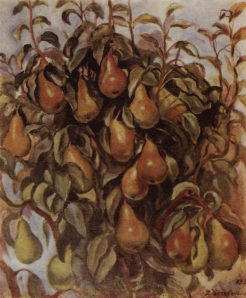
The following biographical thumbnail was extracted from the following site.
http://www.findagrave.com/cgi-bin/fg.cgi?page=gr&GRid=52832781

Birth: Sep. 25, 1847
Newport
Herkimer County
New York, USADeath: Jan. 4, 1918
Asheville
Buncombe County
North Carolina, USA
Madeline Yale Wynne was a talented artist of the Arts & Crafts movement who credits her father, Linus Yale, Jr., with giving her metal
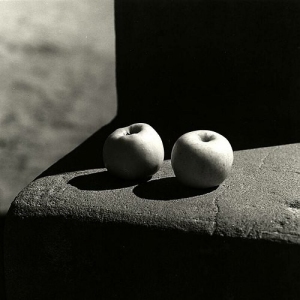 working
experience as a child in his lock shop right beside her brothers. She
studied art with artist George Fuller, a close friend of her father’s
and later at the Museum School of the Museum of Fine Arts in Boston, at
the Arts Students’ League in New York City and in Europe. Madeline
married Henry Winn in 1865 and they had two sons but by 1874 they were
separated. She lived and worked with her brother, Julian, in Chicago
making jewelry but left when he died. She had a major influence on the
Arts & Crafts Movement in Chicago and a group of artists there took
the title of her short story “The Little Room” as the name of their
salon. She spent six months of the year in Deerfield, Massachusetts
where she was president of Deerfield Industries where artisans made and
sold their crafts. Madeline often spent the remainder of the year with
her mother near Boston. In 1883 she began sharing her home and studio
with Miss Annie Putnam and changed the spelling of her last name. In
1885 she and Annie Putnam purchased The Manse in Deerfield and in 1904
they became year-round residents of Deerfield where they were very
active practicing and supporting the arts. She was also an author and
her short story “The Little Room” still appears in anthologies. In her
later years she spent some winter months in Tryon, North Carolina.
working
experience as a child in his lock shop right beside her brothers. She
studied art with artist George Fuller, a close friend of her father’s
and later at the Museum School of the Museum of Fine Arts in Boston, at
the Arts Students’ League in New York City and in Europe. Madeline
married Henry Winn in 1865 and they had two sons but by 1874 they were
separated. She lived and worked with her brother, Julian, in Chicago
making jewelry but left when he died. She had a major influence on the
Arts & Crafts Movement in Chicago and a group of artists there took
the title of her short story “The Little Room” as the name of their
salon. She spent six months of the year in Deerfield, Massachusetts
where she was president of Deerfield Industries where artisans made and
sold their crafts. Madeline often spent the remainder of the year with
her mother near Boston. In 1883 she began sharing her home and studio
with Miss Annie Putnam and changed the spelling of her last name. In
1885 she and Annie Putnam purchased The Manse in Deerfield and in 1904
they became year-round residents of Deerfield where they were very
active practicing and supporting the arts. She was also an author and
her short story “The Little Room” still appears in anthologies. In her
later years she spent some winter months in Tryon, North Carolina.
* The Sick Rose
O Rose thou art sick.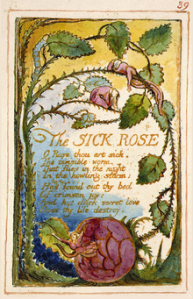
The invisible worm,
That flies in the night
In the howling storm:Has found out thy bed
Of crimson joy:
And his dark secret love
Does thy life destroy.

The invisible worm,
That flies in the night
In the howling storm:Has found out thy bed
Of crimson joy:
And his dark secret love
Does thy life destroy.
William Blake.
************************
Μαντελάιν Γιέιλ Γουίν-Madeline Yale Wynne*
(1847– 1918)
Το Μικρό Δωμάτιο (The Little Room)
Απόδοση: Βασίλης Κ. Μηλίτσης
«Τι λες, θα ταίριαζε για καπνιστήριο;»
«Ακριβώς είναι ό, τι πρέπει το μέρος! Μόνο να ξέρεις, Ρότζερ, πως δεν πρέπει να καπνίζεις μέσα στο σπίτι. Φοβάμαι πως το γεγονός να έχουν στα πόδια τους έναν απλό και συνηθισμένο άντρα, πόσο μάλλον έναν καπνιστή, θα αναστατώσει τη θεία Χάνα. Αυτή είναι από τη Νέα Αγγλία – Βερμόντ, Νέα Αγγλία – αναντάμ παπαντάμ».
«Τη Χάνα άστην πάνω μου. Θα βρω εγώ την αχίλλεια πτέρνα της. Θα τη ρωτήσω για τον γέρο θαλασσόλυκο καπετάνιο και για το κίτρινο τσίτι».
«Όχι το κίτρινο τσίτι – το μπλε κρετόν».
«Ε, τότε το κίτρινο κάλυμμα».
«Ω, όχι! Μην τα μπερδεύεις έτσι, γιατί δε θα ξέρεις τι να περιμένεις, κι έτσι χάνεις τη μισή διασκέδαση».
«Τώρα πες μου ξανά τι να περιμένω. Για να πω την αλήθεια, ούτε καν πρόσεξα τι μου έλεγες τις προάλλες. Απλά ονειροπολούσα. Ήταν κάτι αλλόκοτο που σου συνέβη όταν ήσουν παιδί, έτσι δεν είναι;»
«Κάτι που άρχισε να συμβαίνει πολύ πριν απ’ αυτό, συνέχισε και μπορεί να ξανασυμβεί, πράγμα που απεύχομαι».
«Τι ήταν, λοιπόν;»
«Φοβάμαι μη μας ακούσουν οι υπόλοιποι στο βαγόνι».
«Δε φαντάζομαι, άλλωστε εμείς δεν τους ακούμε – τουλάχιστον, όχι συνεχόμενα».
«Λοιπόν, όπως ξέρεις, η μητέρα μου γεννήθηκε στο Βερμόντ. Ήταν μοναχοπαίδι από δεύτερο γάμο. Η θεία Χάνα και η θεία Μαρία μου είναι, ξέρεις, κατά το ήμισυ θείες μου».
«Ελπίζω να είναι εξίσου κατά το ήμισυ καλές όπως εσύ».
«Ρότζερ, ήσυχα! Θα μας ακούσουν στα σίγουρα, τώρα».
«Λοιπόν, δε θέλεις να μάθουν πως είμαστε παντρεμένοι;»
«Ναι, αλλά όχι νιόπαντροι, πράγμα που είναι πολύ διαφορετικό».
«Φοβάσαι που είμαστε τόσο ευτυχισμένοι!»
«Όχι, μόνο που θέλω η ευτυχία να είναι όλη δική μου».
«Λοιπόν; Πες μου τώρα για το μικρό δωμάτιο».
Οι θείες μου μεγάλωσαν τη μητέρα μου. Ήσαν είκοσι χρόνια μεγαλύτερές της. Θα έλεγα πως τη μεγάλωσαν ο Χάιραμ και οι θείες. Βλέπεις, ο Χάιραμ μαθήτευσε στον παππού μου όταν ήταν παιδί και όταν πέθανε ο παππούς ο Χάιραμ υπέθεσα ότι ήταν αναπόσπαστο μέρος της φάρμας μαζί με τα άλλα ζωντανά και μένει εκεί έκτοτε. Ήταν το καταφύγιο της μητέρας μου όταν αυτή ήθελε να ξεφύγει από τον καθωσπρεπισμό των θειών μου. Αυτές είναι, όμως, απλές και σκληρά εργαζόμενες γυναίκες. Με κάνουν να σκέφτομαι τη γυναίκα του Μέιν να θέλει στην ταφόπλακά της την επιγραφή:
Ενθάδε κείται μια σκληρά εργαζόμενη γυναίκα.
«Πόσο χρονών είναι;»
«Γύρω στα εβδομήντα, αλλά θα πεθάνουν όρθιες ή τουλάχιστον, κάποιο Σαββατόβραδο, αφού θα έχουν σιάξει όλο το σπίτι. Με τη μητέρα μου ήταν μάλλον αυστηρές και νομίζω πως είχε μοναχικά παιδικά χρόνια. Το σπίτι απείχε σχεδόν ένα μίλι από όλους τους γείτονες και ήταν κτισμένο στην κορυφή ενός λόφου που τον ονόμαζαν Πέτρινο Λόφο. Και είναι ένα αρκετά μοναχικό και ανεμοδαρμένο σπίτι ακόμη και το καλοκαίρι.
«Όταν η μαμά ήταν περίπου δέκα χρονών, την έστειλαν στα ξαδέρφια της που έμεναν στο Μπρούκλιν, τα οποία είχαν δικά τους παιδιά και ήξεραν καλύτερα πώς να τη μεγαλώσουν. Έμεινε μαζί τους έως ότου παντρεύτηκε. Όλο αυτό το διάστημα δεν πήγε στο Βερμόντ και συνεπώς δεν είδε τις αδερφές της, μια κι αυτές δεν το κουνούσαν απ’ το σπίτι τους ούτε για μια μέρα. Δεν εννοούσαν ούτε καν να πάνε στο γάμο της, γι’ αυτό η ίδια και ο πατέρες μου έκαναν το ταξίδι του μέλιτος εκεί».
«Και γι’ αυτό τώρα κάνουμε κι εμείς το ταξίδι του μέλιτος εκεί με τη σειρά μας;»
«Μη, Ρότζερ, δεν έχεις ιδέα πώς ακούγεσαι όταν μιλάς τόσο δυνατά».
«Ποτέ δεν μιλάς έτσι εκτός όταν πάω να πω εκείνη τη λεξούλα».
«Ε, τότε μην τη λες, ή πες την πολύ, μα πολύ σιγανά».
«Λοιπόν, ποιο ήταν το αλλόκοτο πράγμα;»
»Όταν έφτασαν σπίτι, η μητέρα ήθελε να δείξει στον πατέρα αμέσως το μικρό δωμάτιο. Του έλεγε συνέχεια γι’ αυτό, ακριβώς όπως θα κάνω κι εγώ τώρα, και του είπε πως απ’ όλα τα δωμάτια εκείνο ήταν το μόνο που της φαινόταν ευχάριστο. Του περιέγραψε τα έπιπλα, τα βιβλία, την ταπετσαρία στους τοίχους, τα πάντα. Είπε πως βρισκόταν στη βόρεια πλευρά του σπιτιού, μεταξύ του μπροστινού και του πίσω δωματίου. Λοιπόν, όταν πήγαν να το βρουν, δεν υπήρχε κανένα μικρό δωμάτιο εκεί. Υπήρχε μόνο ένα στενό σκρίνιο με πορσελάνες. Ρώτησε τις αδερφές της πότε έκαναν μετατροπές στο σπίτι και αντικατέστησαν το δωμάτιο με το σκρίνιο. Και οι δυο τους είπαν πως το σπίτι ήταν όπως ακριβώς είχε κτιστεί – ότι ποτέ δεν είχαν κάνει καμιά αλλαγή, παρά μόνο που γκρέμισαν την παλιά παράγκα κι έκτισαν μια μικρότερη.
»Ο πατέρας και η μητέρα γέλασαν πολύ με το συμβάν και όταν κάτι χανόταν, συνήθιζαν πάντοτε να λένε πως θα ήταν στο μικρό δωμάτιο και κάθε τι υπερβολικό που έλεγε κάποιος, του κολλούσαν την ετικέτα ‘του μικρού δωματίου’. Όταν ήμουν μικρή πίστευα πως ήταν μια συνηθισμένη γλωσσική έκφραση – τόσο συχνά την είχα ακούσει.
»Λοιπόν, το είχαν συζητήσει και τελικά κατέληξαν στο συμπέρασμα πως η μητέρα μου ήταν ένα ευφάνταστο παιδί, και είχε διαβάσει σχετικά μ’ ένα τέτοιο μικρό δωμάτιο ή ίσως ακόμη και να το ονειρεύτηκε και κατόπιν προσποιούταν ότι έτσι ήταν στ’ αλήθεια, όπως κάνουν τα παιδιά, μέχρι που η ίδια το πίστεψε πως πραγματικά υπήρχε το δωμάτιο στο σπίτι».
«Μα, φυσικά, κάτι τέτοιο θα μπορούσε εύκολα να συμβεί».
«Ναι, αλλά δεν έχεις ακόμη ακούσει το παράξενο της ιστορίας: περίμενε και δες μόνος σου αν μπορείς να εξηγήσεις εύκολα τα όσα ακολουθούν.
»Έμειναν στη φάρμα δυο βδομάδες και κατόπιν πήγαν να ζήσουν στη Νέα Υόρκη. Όταν ήμουν οκτώ ετών, ο πατέρας μου σκοτώθηκε στον πόλεμο και η μητέρα καταβλήθηκε από τη λύπη και την απόγνωση. Ποτέ δεν επανέκτησε τη δύναμή της, κι εκείνο το καλοκαίρι αποφασίσαμε να πάμε να μείνουμε στη φάρμα για τρεις μήνες.
»Ήμουν ένα ιδιαίτερα ανήσυχο παιδί, και το ταξίδι μου φαινόταν πολύ μεγάλο. Τελικά η μαμά μού αφηγήθηκε την ιστορία του μικρού δωματίου και πώς το όλο θέμα ήταν στη φαντασία της και πώς το μόνο που υπήρχε εκεί ήταν το σκρίνιο με τις πορσελάνες.
»Μου το αφηγήθηκε με τόση λεπτομέρεια, που αν και εκ των προτέρων ήξερα πως δεν υπήρχε το δωμάτιο, μου φάνηκε πολύ αληθινή. Μου είπε πως το δωμάτιο βρισκόταν στη βορεινή πλευρά ανάμεσα στο μπροστινό και το πίσω δωμάτιο, πως ήταν πολύ μικρό και γι’ αυτό μερικές φορές το αποκαλούσαν αντρέ. Είχε και μια πόρτα που άνοιγε προς τα έξω, βαμμένη πράσινη και δίφυλλη σαν τις παλιές ολλανδικές πόρτες που το πάνω φύλλο γίνεται παράθυρο. Ακριβώς απέναντι από την πόρτα ήταν ένα ντιβάνι ή καναπές καλυμμένος με μπλε ινδικό κρετόν, το οποίο έφερε κάποιος γερο-θαλασσόλυκος καπετάνιος του Σέιλεμ σαν ταξιδιωτικό ‘έπαθλο’. Αυτό το ύφασμα το είχε δωρίσει στη Χάνα, όταν αυτή ήταν νεαρό κορίτσι. Η Χάνα είχε πάει σχολείο στο Σέιλεμ για δυο χρόνια. Ο παππούς αρχικά καταγόταν από το Σέιλεμ».
«Είχα την εντύπωση πως δεν υπήρχε κανένα δωμάτιο ούτε κρετόν».
«Ακριβώς εδώ είναι το θέμα τώρα. Είχαν κατασταλάξει στο συμπέρασμα ότι η μητέρα μου είχε φανταστεί το μικρό δωμάτιο, κι όμως βλέπεις με πόση ακρίβεια είχε ζωγραφίσει τα πάντα στον νου της, και είχε ακόμη θυμηθεί ότι ο Χάιραμ της είπε πως η Χάνα θα μπορούσε να παντρευτεί τον καπετάνιο αν το ήθελε!
»Το ινδικό βαμβακερό ύφασμα ήταν το συνηθισμένο σταμπαρισμένο μπλε κρετόν, με μια φιγούρα παγωνιού πάνω του. Το κεφάλι και το σώμα του πουλιού ήταν σχεδιασμένα σε προφίλ, ενώ η ουρά πίσω του ήταν σε πλήρες ανφάς. Η μητέρα μου είχε ξετρελαθεί με το παγώνι και μου το σχεδίασε σ’ ένα κομμάτι χαρτί καθώς μου μιλούσε. Δε σου φαίνεται παράξενο ότι θα μπορούσε να τα βγάλει όλα αυτά από το μυαλό της ή να τα είχε ονειρευτεί;
»Κοντά στον καναπέ υπήρχαν μερικά εντοιχισμένα ράφια με μερικά παλιά βιβλία πάνω τους. Όλα τα βιβλία ήταν δεμένα με χρωματιστό δέρμα εκτός από ένα με τον τίτλο Το Λεύκωμα των Κυριών. Αποτελούσε μια εμφανή εξαίρεση ανάμεσα στα υπόλοιπα χοντρά βιβλία.
»Στο κάτω ράφι ήταν τοποθετημένο ένα ροζ κοχύλι πάνω σ’ ένα πενιέ βαθυκόκκινο ύφασμα. Η μητέρα μου διακαώς εποφθαλμιούσε αυτό το κοχύλι, αλλά είχε την άδεια να παίζει μ’ αυτό μόνο αν ήταν ιδιαίτερα φρόνιμη. Ο Χάιραμ της είχε δείξει πώς να το κρατάει κοντά στο αυτί της και ν’ ακούει τη βουή της θάλασσας μέσα του.
»Είμαι σίγουρη πως θα συμπαθήσεις τον Χάιραμ, Ρότζερ. Είναι ένας ιδιαίτερα εξαιρετικός τύπος.
»Η μαμά είπε ότι θυμόταν ή νόμισε ότι θυμόταν, κάποτε που είχε αρρωστήσει και έπρεπε να μείνει ήσυχη για μερικές μέρες ξαπλωμένη στον καναπέ. Και τότε ήταν που είχε εξοικειωθεί τόσο πολύ με ό, τι υπήρχε μέσα στο δωμάτιο και της επιτράπηκε να παίζει με το κοχύλι όλη την ώρα. Προσποιούταν ότι παράγγελνε τις φρυγανιές της εκεί με το τσάι της. Ήταν οι καλύτερες αναμνήσεις από τα παιδικά της χρόνια, και ήταν η πρώτη φορά που ένιωσε σπουδαία σε κάποιον, ακόμη και στον εαυτόν της.
»Ακριβώς στην κεφαλή του καναπέ υπήρχε ένας ‘λυχνοστάτης’, όπως τον έλεγαν, πάνω στον οποίο έστεκε ένα γυαλισμένο μπρούντζινο κηροπήγιο κι ένας μπρούντζινος δίσκος με κηροσβέστες. Αυτά είναι που θυμάμαι από την περιγραφή της μαζί με ένα πενιέ χαλάκι πάνω στο δάπεδο, ενώ οι τοίχοι ήταν καλυμμένοι με μια όμορφη λουλουδάτη ταπετσαρία – τριαντάφυλλα και χωνάκια σε σχήμα στεφανιού και σε απαλό γαλάζιο φόντο. Η ίδια ταπετσαρία κάλυπτε και τους τοίχους του μπροστινού δωματίου».
«Και όλα τούτα δεν υπήρξαν ποτέ παρά στη φαντασία της;»
«Είπε πως, όταν αυτή και ο πατέρας ανέβηκαν στη φάρμα, δεν υπήρχε κανένα μικρό δωμάτιο πουθενά στο σπίτι. Αντί για το υποτιθέμενο δωμάτιο υπήρχε στη θέση του ένα σκρίνιο με πορσελάνες».
«Και οι θείες σου ισχυρίστηκαν πως ποτέ δεν υπήρχε ένα τέτοιο δωμάτιο».
«Ακριβώς αυτό είπαν».
«Δεν βρέθηκε πουθενά στο σπίτι κανένα μπλε κρετόν με τη φιγούρα παγωνιού;»
«Ούτε για δείγμα, και η θεία Χάνα είπε πως ποτέ δεν έγινε κάτι τέτοιο απ’ όσο θυμόταν, πράγμα που σαν ηχώ το επιβεβαίωνε και η θεία Μαρία – πάντα το έκανε αυτό. Βλέπεις, η θεία Χάνα είναι μια ενημερωμένη γυναίκα της Νέας Αγγλίας. Έχει έντονο χαρακτήρα. Οι αρθρώσεις της κινούνται πάνω-κάτω, μπρος-πίσω μ’ έναν απλό και αδρό τρόπο. Δεν πιστεύω να έχει ποτέ χρησιμοποιήσει μπαστούνι στη ζωή της ή να έχει καθίσει σε μια άνετη πολυθρόνα. Αλλά η θεία Μαρία είναι διαφορετική: είναι παχουλή και μαλθακή. Πότε δεν έχει τη δική της γνώμη κι ούτε ποτέ είχε. Δεν πιστεύω ότι θα το θεωρούσε σωστό και πρέπον να έχει διαφορετική γνώμη από την θεία Χάνα, κι εξάλλου σε τι θα ωφελούσε; Αυτή είναι απλώς μια ηχώ.
»Όταν η μαμά κι εγώ φτάσαμε εκεί, φυσικά, είχα τρομερή περιέργεια να δω το σκρίνιο με τις πορσελάνες, αλλά είχα κι ένα προαίσθημα ότι τελικά θα υπήρχε το μικρό δωμάτιο. Γι’ αυτό έσπευσα πρώτη και άνοιξα την πόρτα ορθάνοικτη, ξεφωνίζοντας ‘έλα, έλα να δεις το μικρό δωμάτιο’.
»Και Ρότζερ», είπε η κυρία Γραντ, πιάνοντας το χέρι του άντρα της, «υπήρχε στ’ αλήθεια το μικρό δωμάτιο εκεί, ακριβώς όπως το θυμόταν η μητέρα. Εκεί ήταν ο καναπές, το κρετόν με το παγώνι, η πράσινη πόρτα, το κοχύλι, η ταπετσαρία με τα τριαντάφυλλα και τα χωνάκια, όλα ακριβώς όπως μου τα είχε περιγράψει».
«Τι στην ευχή είπαν οι αδερφές της γι’ αυτό;»
«Περίμενε και θα σου πω. Η μητέρα μου ήταν στο μπροστινό χολ και μιλούσε με τη θεία Χάνα. Στην αρχή δε μ’ άκουσε, αλλά εγώ έτρεξα προς το μέρος της και την τράβηξα μέσα στο μπροστινό δωμάτιο λέγοντας: ‘το δωμάτιο είναι εδώ – είναι όπως το είπες’.
»Για μια στιγμή φάνηκε πως η μητέρα μου θα λιποθυμούσε. Μ’ έσφιξε τρομοκρατημένη. Θυμάμαι τώρα πόσο καταπονημένα ήταν τα μάτια της και πόσο χλωμή ήταν.
»Φώναξα τη θεία Χάνα και τη ρώτησα πότε έβγαλαν το σκρίνιο και έφτιαξαν το μικρό δωμάτιο, γιατί πάνω στη έξαψή μου νόμισα ότι αυτό είχε γίνει. ‘Αυτό το δωμάτιο είναι εδώ’ απάντησε η θεία Χάνα, ‘από τότε που κτίστηκε το σπίτι’. ‘Όμως η μαμά λέει, όταν σαν επισκέφτηκε με τον μπαμπά, πως δεν υπήρχε κανένα μικρό δωμάτιο εδώ, παρά μόνο το σκρίνιο με τις πορσελάνες’, πρόσθεσα εγώ. ‘Όχι, ποτέ δεν υπήρχε κανένα σκρίνιο με πορσελάνες. Το καθετί ήταν πάντα όπως είναι τώρα’, είπε η θεία Χάνα.
»Τότε πήρε τον λόγο η μητέρα. Η φωνή της ακουγόταν αδύναμη και απόμακρη. Είπε με αργή φωνή και καταβάλλοντας μεγάλη προσπάθεια: ‘Μα, Μαρία, δε θυμάσαι που μου είπες ότι ποτέ δεν υπήρξε κανένα μικρό δωμάτιο εδώ; Και η Χάνα το επιβεβαίωσε και είπε πως πρέπει να το ονειρεύτηκα;’
»‘Όχι, δε θυμάμαι κάτι τέτοιο είπε η Μαρία χωρίς το παραμικρό συναίσθημα. ‘Δε θυμάμαι να έχω ποτέ πει κάτι για κανένα σκρίνιο με πορσελάνες. Ποτέ δεν έγινε καμιά μετατροπή στο σπίτι. Εσύ συνήθιζες να παίζεις σ’ αυτό το μικρό δωμάτιο όταν ήσουν παιδί, δε θυμάσαι;’
»‘Μα είμαι σίγουρη’, είπε η μητέρα μου με μια παράξενη, αργόσυρτη φωνή που με φόβισε. ‘Χάνα, εσύ τουλάχιστον δε θυμάσαι που είδα εδώ το σκρίνιο με τις επίχρυσες πορσελάνες πάνω στα ράφια και τότε εσύ τότε είχες πει πως το σκρίνιο ήταν πάντα εδώ; ‘Όχι’ έκανε χαρούμενα αλλά ατάραχα η Χάνα – ‘όχι, δε νομίζω να μου έχεις ποτέ ρωτήσει για το σκρίνιο, κι εμείς ποτέ δεν είχαμε επίχρυσες πορσελάνες, απ’ όσο ξέρω’.
»Κι αυτό ήταν το πιο παράξενο πράγμα στην ιστορία αυτή. Δεν μπορέσαμε ποτέ να τις κάνουμε να θυμηθούν πως υπήρξε ποτέ ζήτημα για όλο αυτό. Θα νόμιζες πως θα μπορούσαν να θυμηθούν πόσο είχε εκπλαγεί η μητέρα μου πριν, εκτός κι αν αυτή τα είχε φανταστεί όλα αυτά. Ω, το πράγμα ήταν τόσο αλλόκοτο! Μας συμπεριφερόταν χαρούμενα όσον αφορούσε αυτό το ζήτημα, αλλά δεν έδειχναν κανένα ενδιαφέρον ή περιέργεια. Η απάντηση ήταν πάντα η εξής: ‘Το σπίτι είναι ακριβώς όπως κτίστηκε. Καμιά μετατροπή δεν έχει γίνει ποτέ, απ’ όσο γνωρίζουμε’. ‘Και η μητέρα μου βρισκόταν σε κατάσταση αμηχανίας και αγωνίας. Πόσο ψυχρά μου φαίνονταν τα γκρίζα τους μάτια! Ήταν εντελώς ανεξιχνίαστα. Και τούτο το αλλόκοτο πράγμα ήταν που κατέβαλε τη μητέρα μου. Πολλές φορές εκείνο το καλοκαίρι, μέσα στη νύχτα, την έβλεπα να σηκώνεται, να παίρνει ένα κερί και να κατεβαίνει απαλά. Άκουγα τα βήματά της να τρίζουν κάτω από το βάρος της. Κατόπιν διέσχιζε το μπροστινό δωμάτιο και κοίταζε περιεργαζόμενη το σκοτάδι κρατώντας το κερί στο λεπτό της χέρι μπροστά στα μάτια της. Φαινόταν να φοβάται μήπως και εξαφανιστεί το μικρό δωμάτιο. Ύστερα ξαναερχόταν πίσω στο κρεβάτι της και στριφογύριζε όλη νύχτα ή έμεινε ξαπλωμένη και τουρτούριζε, πράγμα που με τρόμαζε.
»Άρχισε να χάνει το χρώμα της, ν’ αδυνατίζει και να βήχει. Επίσης δεν μπορούσε να μένει μόνη της. Μερικές φορές με διάφορες προφάσεις μ’ έστελνε στο μικρό δωμάτιο για να φέρω κάτι – ένα βιβλίο ή τη βεντάλια της ή το μαντήλι της, αλλά ποτέ δεν καθόταν εκεί και ποτέ δε μ’ άφηνε να μένω εκεί για πολύ. Μερικές φορές μάλιστα δε μου επέτρεπε να πηγαίνω εκεί για μέρες εν συνεχεία. Ω, η κατάσταση είχε καταντήσει αξιοθρήνητη!»
«Έλα, μη μιλάς άλλο γι’ αυτό, Μάργκαρετ, εάν σε πειράζει τόσο πολύ», είπε ο κύριος Γκραντ.
«Μα θέλω να ξέρεις τα πάντα για όλη την ιστορία κι εξάλλου δεν έχω άλλα – δεν έχω τίποτε άλλο να πω για το δωμάτιο.
»Η μητέρα δεν ανάρρωσε ποτέ και πέθανε εκείνο το φθινόπωρο. Συνέχεια αναστέναζε λέγοντας μ’ ένα άχρωμο, αδύναμο γέλιο: ‘Υπάρχει ένα πράγμα για το οποίο είμαι χαρούμενη, Μάργκαρετ. Ο πατέρας σου έμαθε τώρα για το μικρό δωμάτιο’. Νομίζω πως φοβόταν ότι δεν την πίστευα. Φυσικά, κατά κάποιο παιδικό τρόπο, πίστευα πως υπήρχε κάτι το αλλόκοτο σ’ όλο αυτό, αλλά δεν καθόμουν να το πολυσκεφτώ. Ήμουν πάρα πολύ νέα την εποχή εκείνη, και το εκλάμβανα σαν μέρος της αρρώστιας της. Αλλά, Ρότζερ, ξέρεις, το θέμα μ’ επηρέασε αληθινά. Και σχεδόν απεχθάνομαι να ξαναπάω εκεί μετά απ’ αυτά που σου είπα. Κατά κάποιον τρόπο νιώθω, ξέρεις, πως θα βρω το σκρίνιο με τις πορσελάνες ξανά».
«Μα αυτή η ιδέα είναι παράλογη».
«Το ξέρω. Φυσικά τέτοιο πράγμα δεν μπορεί να αληθεύει. Είδα το δωμάτιο, και δεν υπάρχει κανένα σκρίνιο εκεί, κι ούτε επίχρυσες πορσελάνες στο σπίτι». Και κατόπιν ψιθύρισε: «Όμως, Ρότζερ, να μου κρατάς το χέρι όπως τώρα, αν το θέλεις, όταν θα πάμε να ψάξουμε το μικρό δωμάτιο».
«Κι εσύ δε θα δώσεις σημασία στα γκρίζα μάτια της θείας Χάνα;»
«Δε θα δώσω σημασία σε τίποτε».
Ήταν σούρουπο όταν το ζεύγος Γκραντ πέρασε την πύλη κάτω από δυο γέρικες, πανύψηλες λεύκες Λομβαρδίας και ανέβηκαν περπατώντας το στενό δρομάκι μέχρι την πόρτα, όπου τους υποδέχθηκαν οι δυο θείες.
Η Χάνα έδωσε στην κυρία Γκραντ ένα παγερό, αλλά όχι αφιλόξενο, φιλί. Η Μαρία φάνηκε προς στιγμήν να βρίσκεται τρέμοντας στο χείλος της συγκίνησης, αλλά ρίχνοντας μια ματιά στη Χάνα, χαιρέτησε το ζεύγος με τον ίδιο καταπιεσμένο και επιφυλακτικό τρόπο.
Το δείπνο ήταν έτοιμο. Το τραπέζι ήταν στρωμένο επίσημα με επίχρυσες πορσελάνες. Η κυρία Γκράντ δεν τις παρατήρησε αμέσως, μέχρι τη στιγμή που είδε τον άντρα της να χαμογελά πάνω από το φλιτζάνι του. Αυτό την έκανε να νιώσει ανήσυχη και να της κοπεί η όρεξη. Ήταν νευρική και συνέχεια αναρωτιόταν τι είναι πίσω της – ήταν άραγε το μικρό δωμάτιο ή το σκρίνιο;
Μετά το δείπνο η Μάργκαρετ προσφέρθηκε να βοηθήσει με τα πιάτα, αλλά έλεος! Θα μπορούσε κάλλιστα να βοηθήσει ν’ αλλάξει τη σειρά των εποχών. Η Μαρία και η Χάνα δε δεχόταν βοήθεια σε καμιά περίπτωση. Κι έτσι αυτή με τον άντρα πήγαν να βρουν το μικρό δωμάτιο ή το σκρίνιο ή ό, τι τέλος πάντων ήταν εκεί. Η θεία Μαρία τους ακολούθησε κρατώντας τη λάμπα, που την τοποθέτησε στη θέση της, και γύρισε στο πλύσιμο των πιάτων.
Η Μάργκαρετ κοίταξε τον άντρα της. Τη φίλησε επειδή την είδε προβληματισμένη, και μετά, χέρι-χέρι, άνοιξαν την πόρτα. Άνοιγε σ’ ένα σκρίνιο με πορσελάνες. Τα ράφια ήταν συστηματικά στρωμένα με χάρτινα πετσετάκια, περίτεχνα ψαλιδισμένα στις άκρες, και πάνω τους τοποθετημένα διάφορα πορσελάνινα σκεύη. Έλλειπαν μόνο τα πιατικά που χρησιμοποιήθηκαν στο δείπνο, τα οποία την ώρα αυτή οι δυο αδερφές τα έπλυναν και τα σκούπιζαν.
Ο άντρας της Μάργκαρετ άφησε απότομα το χέρι της κοιτάζοντάς την. Αυτή ένιωσε ένα ρίγος προς στιγμήν και γύρισε προς το μέρος του για βοήθεια, για κάποια εξήγηση, αλλά αμέσως κατάλαβε πως κάτι δεν πήγαινε καλά. Ένα σύννεφο μπήκε ανάμεσά τους. Ο άντρας ένιωσε θιγμένος και πληγωμένος. Στάθηκε σιωπηλός για αρκετές στιγμές και κατόπιν είπε, αρκετά καλοσυνάτα, αλλά με φωνή που της έκοβε τα σωθικά: «Πάντως χαίρομαι πως όλο αυτό το παράλογο και αστείο θέμα έληξε. Ας μη μιλήσουμε πλέον γι’ αυτό».
«Έληξε!» είπε . «Πώς έληξε;» και κατά κάποιο τρόπο η φωνή της ακούστηκε στ’ αυτιά της όπως είχε ακουστεί και της μητέρας της καθώς στεκόταν και ανάκρινε τις αδερφές της για το μικρό δωμάτιο. Φαινόταν πως με το ζόρι έβγαιναν οι λέξεις από το στόμα της. Αργά-αργά συνέχισε: «Μου φαίνεται ότι και στη δική μου περίπτωση ξανάρχισε το ζήτημα όπως ακριβής με τη μητέρα όταν αυτή – »
«Πολύ θα σε παρακαλούσα, Μάργκαρετ, να το σταματήσουμε εδώ. Δε μ’ αρέσει να σ’ ακούω να μιλάς για τη μητέρα σου σε σχέση μ’ αυτό. «Δεν – », δίστασε να συνεχίσει, διότι στο κάτω- κάτω ήταν κι η μέρα του γάμου τους. «Δεν είναι νομίζω πρέπον, ξέρεις, να χρησιμοποιείς το όνομά της στην προκειμένη περίσταση».
Τώρα το κατάλαβε πολύ καλά: Δεν την πίστευε. Ένιωσε μια κρυάδα να τη διαπερνά κάτω από το βλέμμα του.
«Έλα», πρόσθεσε, «ας βγούμε έξω ή να ξαναγυρίσουμε στην τραπεζαρία, κάπου, οπουδήποτε, τέλος πάντων, μόνο να κόψουμε αυτή την ανοησία».
Βγήκε έξω χωρίς να την πάρει από το χέρι τη φορά αυτή – ένιωθε εκνευρισμένος, σαστισμένος, πληγωμένος. Δεν την πίστεψε άραγε, δεν της έδειξε την κατανόησή του, την προσοχή του, δεν της έδωσε το χέρι του; – κι αυτή να τον κοροϊδεύει; Τι σήμαινε όλο αυτό; – ήταν τόσο φιλαλήθης, τόσο απαλλαγμένη από νοσηρότητα – πράγμα που ο ίδιος απεχθανόταν. Περπατούσε πάνω κάτω ανάμεσα στις λεύκες, πασχίζοντας να φτιάξει τη διάθεσή του για να πάει να βρεθεί πάλι μαζί της στο σπίτι. Η Μάργκαρετ γύρισε και κούνησε θυμωμένη τα ράφια. Έβαλε το χέρι της πίσω από το σκρίνιο και δοκίμασε να σπρώξει τα σανίδια προς τα έξω. Βγήκε τρέχοντας από το σπίτι και πήγε στο βορεινό μέρος και προσπάθησε ψηλαφώντας στο σκοτάδι να βρει μια πόρτα ή κάποια σκαλιά να οδηγούν σε πόρτα. Έσκισε το φόρεμά της στην παλιά τριανταφυλλιά, έπεσε και σηκώθηκε, σκόνταψε και μετά κάθισε στο χώμα προσπαθώντας να συγκεντρώσει τις σκέψεις της – μήπως έβλεπε εφιάλτη;
Μπήκε στο σπίτι και κατευθύνθηκε στην κουζίνα. Παρακάλεσε επίμονα τη θεία Μαρία να της πει για το μικρό δωμάτιο – τι απέγινε όταν τοποθέτησαν εκεί το σκρίνιο, πότε είχαν αγοράσει τις επίχρυσες πορσελάνες;
Οι δυο αδερφές συνέχισαν να πλένουν τα πιάτα και να τα σκουπίζουν στις πεντακάθαρες πετσέτες με μεθοδική ακρίβεια. Και καθώς συνέχιζαν τη δουλειά τους είπαν πως ποτέ δεν είχε υπάρξει κανένα μικρό δωμάτιο, απ’ όσο γνώριζαν. Το σκρίνιο με τις πορσελάνες ήταν πάντα εκεί, και οι επίχρυσες πορσελάνες ανήκαν στη μητέρα τους. Πάντοτε ήταν στο σπίτι.
«Όχι, δε θυμάμαι η μητέρα σου να ρώτησε ποτέ για κανένα μικρό δωμάτιο», είπε η Χάνα. «Εκείνο το καλοκαίρι δεν έδειχνε και πολύ καλά, αλλά ποτέ δε ρώτησε για τυχόν μετατροπές στο σπίτι. Ποτέ δεν έγινε καμιά μετατροπή».
Νάτο πάλι: ούτε ίχνος ενδιαφέροντος, ή περιέργειας, ή ενόχλησης κι ούτε μια αναλαμπή μνήμης.
Βγήκε να βρει τον Χάιραμ. Μιλούσε με τον κύριο Γκραντ για τη φάρμα. Σκόπευε να τον ρωτήσει για το μικρό δωμάτιο, αλλά τα χείλη της σφράγισαν μπροστά στον άντρα της.
Μήνες αργότερα, όταν ο χρόνος είχε απαλύνει την οξύτητα των συναισθημάτων τους, άρχισαν να σκέφτονται λογικά για το φαινόμενο, το οποίο ο κύριος Γκραντ είχε αποδεχτεί σαν κάτι που δεν είναι αξιογέλαστο, ούτε να θεωρηθεί σαν κακόγουστη φάρσα, αλλά θα έπρεπε να το βάλουν σε εκκρεμότητα σαν κάτι το ανεξήγητο σε μια συνηθισμένη θεωρία.
Μόνο η Μάργκαρετ βαθιά μέσα της γνώριζε ότι τα λόγια της μητέρας της είχαν μια βαθύτερη σημασία απ’ ό, τι είχε σκεφτεί εκείνον τον καιρό. ‘Για ένα πράγμα χαίρομαι, ο πατέρας σου ξέρει τώρα’, και αναρωτιόταν αν ο Ρότζερ ή η ίδια θα μάθαιναν ποτέ την αλήθεια.
Πέντε χρόνια αργότερα θα πήγαιναν στην Ευρώπη. Τελείωσαν το πακετάρισμα, τα παιδιά κοιμούνταν, με τα πάντα έτοιμα να ξεκινήσουν νωρίς την άλλη μέρα.
Ο Ρότζερ είχε μια δουλειά στο εξωτερικό. Δεν επρόκειτο να επιστρέψουν στην Αμερική για κάποια χρόνια. Σκόπευε ν’ ανέβει να αποχαιρετήσει τις θείες της, αλλά μια μητέρα πια τριών παιδιών που σκοπεύει να κάνει πολλά πράγματα, ποτέ δεν τα καταφέρνει. Ένα πράγμα έκανε εκείνη τη μέρα, και καθώς δίστασε προς στιγμήν ποιο από τα δυο γράμματα μπροστά της να γράψει και να το στείλει πριν πέσει για ύπνο, είπε:
«Ρότζερ, θυμάσαι τη Ρίτα Λας; Λοιπόν, αυτή και η ξαδέρφη Ναν πηγαίνουν στα όρη Αντιροντάκ κάθε φθινόπωρο. Είναι έξυπνες κοπέλες και τους έχω αναθέσει κάτι που θέλω πάρα πολύ να γίνει».
«Είναι κορίτσια με τα όλα τους τότε που μπορούν να κάνουν αυτό που θέλεις».
«Είμαι σίγουρη πως θα το κάνουν».
«Λοιπόν, τι θα κάνουν;»
«Να, Ρότζερ, ξέρεις, εκείνο το μικρό δωμάτιο –»
«Ω –»
«Ναι, ήμουν δειλή να μην πάω η ίδια, αλλά δε βρήκα ευκαιρία κι εξάλλου δεν είχα το θάρρος».
«Ω! ώστε αυτό ήταν, έτσι;».
«Ναι, έτσι. Θα πάνε και θα μας γράψουν για το ζήτημα».
«Πας στοίχημα;»
«Όχι. Θέλω μόνο να μάθω την αλήθεια».
Η Ρίτα Λας και η ξαδέρφη Ναν σχεδίασαν να πάνε στο Βερμόντ καθώς ήταν ο δρόμος τους προς τα Αντιροντάκ. Ανακάλυψαν πως είχαν τρεις ώρες διαθέσιμες για την ανταπόκριση των τρένων τους, πράγμα που είχαν χρόνο να πάνε μέχρι τη φάρμα των Κις, και θα μπορούσαν να βρεθούν στην κατασκήνωση το ίδιο βράδυ. Την τελευταία, όμως, στιγμή, κάτι έτυχε στη Ρίτα. Κι έτσι η Ναν αναγκάστηκε να συναντήσει μόνη της την ομάδα για τα Αντιροντάκ, και υποσχέθηκε να της τηλεγραφήσει όταν θα έφτανε στην κατασκήνωση. Φανταστείτε την ευθυμία της Ρίτας όταν έλαβε το τηλεγράφημα με το μήνυμα: ‘Έφτασα με ασφάλεια – πήγα φάρμα Κις – μικρό δωμάτιο υπαρκτό».
Η Ρίτα γέλασε, διότι ούτε στιγμή πίστεψε πως η Ναν είχε πάει εκεί. Είχε την εντύπωση πως την κορόιδεψε, αλλά το έβαλε στο νου της να συνεχίσει το αστείο παραπέρα με το να επισκεφτεί η ίδια τη φάρμα όταν θα ανέβαινε, όπως σκόπευε να κάνει την επόμενη βδομάδα.
Πράγματι πήγε και τις επισκέφτηκε. Συστήθηκε στις δυο γεροντοκόρες, οι οποίες της φάνηκαν οικείες από την περιγραφή της κυρίας Γκραντ.
Αν και δεν ήταν εγκάρδιες, τουλάχιστον δεν ενοχλήθηκαν από την επίσκεψή της, και πρόθυμα της έδειξαν το σπίτι. Επειδή δεν είπαν τίποτε για το γεγονός πως κάποιος πρόσφατα τις είχε επίσης επισκεφτεί, έμεινε σταθερή στην πεποίθησή της ότι η Ναν δεν είχε πάει εκεί. Στο βορεινό δωμάτιο είδε στον τοίχο την ταπετσαρία με τα τριαντάφυλλα και τα χωνάκια, και επίσης την πόρτα που άνοιγε σε – τι; Ρώτησε αν μπορούσε ν’ ανοίξει την πόρτα.
«Βεβαίως», είπε η Χάνα και η Μαρία αντήχησε,
«Βεβαίως».
Την άνοιξε και αντίκρισε το σκρίνιο με τις πορσελάνες. Αμέσως δοκίμασε μια κάποια ανακούφιση. Τουλάχιστον δε βρισκόταν κάτω από καμιά μαγική επιρροή. Η κυρία Γκραντ είχε βρει ένα σκρίνιο με πορσελάνες, πράγμα που βρήκε και η Ρίτα. Ωραία. Όμως προσπάθησε να κάνει τις ηλικιωμένες αδερφές να θυμηθούν πως σε διαφορετικές περιόδους είχε γίνει ζήτημα σχετικά με μια σύγχυση εάν το σκρίνιο ήταν πάντα ένα σκρίνιο. Δεν ωφελούσε. Τα παγερά τους μάτια έμειναν ανέκφραστα. Κατόπιν σκέφτηκε την ιστορία με τον καπετάνιο και ρώτησε: «Δεσποινίς Κις, είχατε ποτέ καναπέ με κάλυμμα από ινδικό κρετόν, με μια φιγούρα παγωνιού πάνω του, που σας το έδωσε ένας καπετάνιος που το έφερε από την Ινδία;»
«Δεν ξέρω αν ποτέ είχα κάτι τέτοιο», είπε η Χάνα. Κι αυτό ήταν όλο. Νόμισε πως είδε τα μάγουλα της Μαρίας να κοκκινίζουν λιγάκι, αλλά τα μάτια της παρέμειναν σαν πέτρινος τοίχος.
Εκείνο το βράδυ συνέχισε την πορεία της προς τα Αντιροντάκ. Όταν πλέον η Ναν κι αυτή βρέθηκαν μόνες στο δωμάτιό τους, η Ρίτα ρώτησε: «Επί τη ευκαιρία, Ναν, τι είδες στο σπίτι της φάρμας; Τι γνώμη σχημάτισες για τη Μαρία και τη Χάνα;» Η Ναν δεν υποπτεύθηκε πως η και Ρίτα είχε πάει εκεί και άρχισε με ενθουσιασμό να αφηγείται για την επίσκεψή της. Η Ρίτα οπωσδήποτε θα πίστευε πως η Ναν είχε πάει εκεί εάν δεν ήξερε πως το πράγμα δεν ήταν έτσι. Την άφησε να συνεχίσει για λίγο, διασκεδάζοντας με τον ενθουσιασμό της και τον εντυπωσιακό τρόπο με τον οποίο περιέγραψε το πώς άνοιξε την πόρτα και βρήκε το μικρό δωμάτιο. Κατόπιν η Ρίτα είπε: «Αρκετά με τα ψεματάκια σου. Χθες, εγώ η ίδια πήγα στη φάρμα καθώς ανέβαινα και δεν υπάρχει κανένα μικρό δωμάτιο κι ούτε υπήρξε ποτέ. Υπάρχει μόνο ένα σκρίνιο με πορσελάνες, ακριβώς όπως το είχε τελευταία δει η κυρία Γκραντ».
Έκανε πως άδειαζε δήθεν τις αποσκευές της και δε σήκωσε τα μάτια της για μια στιγμή. Αλλά καθώς η Ναν δεν έλεγε τίποτε, γύρισε πίσω και την κοίταξε. Η Ναν είχε γίνει κάτωχρη, και δεν μπορούσε να κρίνει αν ήταν από μεγάλο θυμό ή τρόμο. Ήταν κάτι κι από τα δυο ζωγραφισμένο στο βλέμμα της. Και μετά η Ρίτα της εξήγησε πως το τηλεγράφημα που έλαβε της έβαλε την ιδέα να ανέβει μόνη της στη φάρμα. Βέβαια, δε σκόπευε να αποκλείσει τη Ναν. Μόνο νόμισε – και τότε τη διέκοψε η Ναν: «Δεν είναι όπως τα λες. Είμαι σίγουρη πως δεν είναι έτσι, γιατί πήγα εγώ η ίδια αλλά εσύ δεν πήγες. Αποκλείεται να πήγες γιατί υπάρχει ένα μικρό δωμάτιο.
Ω, τι νύχτα πέρασαν! Αδύνατον να κλείσουν μάτι. Όλο μιλούσαν και μάλωναν, σταματούσαν για λίγο για να ξαναρχίσουν – ήταν τόσο παράλογο. Και οι δυο τους ισχυρίζονταν πως είχαν πάει εκεί, αλλά και οι δυο τους ήταν βέβαιες πως η άλλη ή ήταν τρελή ή παράλογα ισχυρογνώμων. Ένιωθαν άθλια και ήταν εντελώς γελοίο να μαλώνουν δυο φίλες για ένα τέτοιο πράγμα. Αλλά να – πότε μικρό δωμάτιο – πότε σκρίνιο και πάλι απ’ την αρχή.
Το άλλο πρωί η Ναν κάρφωνε σ’ ένα παράθυρο ένα ύφασμα να μην μπαίνουν μέσα οι σκνίπες. Η Ρίτα προσφέρθηκε να τη βοηθήσει, όπως έκανε εδώ και δέκα χρόνια. Το όχι ευχαριστώ της Ναν της ράγισε την καρδιά. «Ναν», είπε «κατέβα αμέσως από τη σκάλα και μάζεψε τα πράγματά σου. Η ταξιδιωτική άμαξα φεύγει ακριβώς σε είκοσι λεπτά. Μπορούμε να προλάβουμε την απογευματινή ταχεία και να πάμε μαζί στη φάρμα. Ή θα πάω εκεί ή επιστρέφω σπίτι. Θα κάνεις καλά να έρθεις μαζί μου».
Η Ναν δεν έβγαλε λέξη. Μάζεψε το σφυρί και τα καρφάκια, κι ετοιμάστηκε να φύγουν όταν έφτασε η άμαξα. Τούτο τώρα σήμαινε τριάντα μίλια πορεία με την άμαξα και έξη ώρες με το τρένο, εκτός του ότι έπρεπε να διασχίσουν και τη λίμνη. Αλλά όλα αυτά δεν συγκρίνονταν με το να έχουν το βάρος ενός ψέματος ανάμεσά τους! Η Ευρώπη φαινόταν εύκολος στόχος να πετύχεις εάν θα τακτοποιούταν αυτή η εκκρεμότητα.
Σε μια μικρή διασταύρωση στο Βερμόντ συνάντησαν έναν γεωργό μ’ ένα κάρο γεμάτο σακιά αλεύρι. Τον παρακάλεσαν αν μπορούσε να τις πάρει μέχρι τη φάρμα των Κις και να τις φέρει πίσω μέσα σε δυο ώρες για να προλάβουν το τρένο. Του είπαν πως είχαν σχεδιάσει ένα καλλιτεχνικό ταξίδι: «Είμαστε ζωγράφοι», είπαν, «κι έχουμε ξαναπάει εκεί. Σκεφθήκαμε πως θα άξιζε τον κόπο να δούμε μερικά τοπία κι εξάλλου θα κάνουμε μια μικρή στάση να επισκεφτούμε τις αδερφές Κις.
«Μήπως θέλατε να ζωγραφίσετε και το παλιό σπίτι;»
Απάντησαν πως θα ήταν δυνατόν να το κάνουν. Τέλος πάντων, ήθελαν να το δουν.
«Ε, τότε φοβάμαι πως είναι ήδη πολύ αργά. Το σπίτι κάηκε ολοσχερώς χθες τη νύχτα μαζί με όλα τα πράγματα που υπήρχαν».
1895
______________________________
Η Αμερικανίδα συγγραφέας Μαντελάιν Γιέλ Γουίν (1847– 1918) γεννήθηκε στο Νιουπόρτ της Νέας Υόρκης και πέθανε στο Άσβιλ της Βόρειας Καρολίνας.
Το 1895 έγραψε το παρόν διήγημα, το οποίο δημοσιεύτηκε σε μια ανθολογία με τον τίτλο Το Μικρό Δωμάτιο και Άλλες Ιστορίες μαζί με τη Συνέχεια στο Μικρό Δωμάτιο.
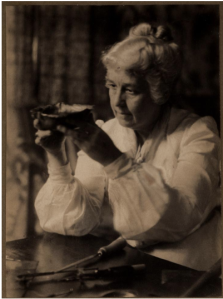



Δεν υπάρχουν σχόλια:
Δημοσίευση σχολίου